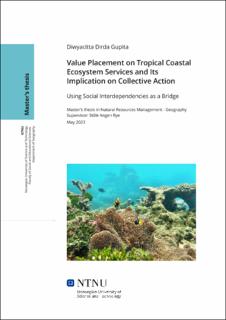| dc.description.abstract | As the marine and coastal ecosystems are experiencing rapid degradation and depletion due to continuous exploitation, government agencies, academic institutions, and various organizations have been working together to develop rules and regulations in an effort to stop the further degradation of these natural resources. However, the burden of coastal and marine ecosystem degradation is being borne by local coastal communities that directly depend on coastal and marine resources, especially those living in less developed countries. Stakeholders are now gradually trying to involve local communities in natural resource management, which is shown by the increasing interest in the formation of community groups and community-based conservation initiatives that not only aim to conserve vulnerable ecosystems, but also to engage and support local communities that rely heavily on common-pool resources.
By using ecosystem services as the basis, and by setting the research location in Karimunjawa Village in Indonesia, this research attempts to see how the placement of value by local communities on ecosystem services can influence the formation of collective actions aimed at conserving the sustainable use of natural resources. This research incorporates the social interdependency framework to examine how local stakeholders interact and form a network of interdependencies within the production and distribution of benefits from ecosystem services, which then leads to collective actions.
The results of this study show that within the network of interactions and interdependencies formed among local communities in Karimunjawa, there are laws, regulations, and actors who are able to exercise power significantly more than other actors. This is shown by how the Karimunjawa National Park Authority (KNPA) exerts strict supervision in terms of activities related to the conservation and use of natural resources that include the production and distribution of ecosystem services. This power dynamic has had a significant impact on how local communities interact with each other. In the case of Karimunjawa Village, the rules and regulations imposed by the KNPA provided little opportunity for the community to develop self-initiated collective action to solve environmental problems. | |
